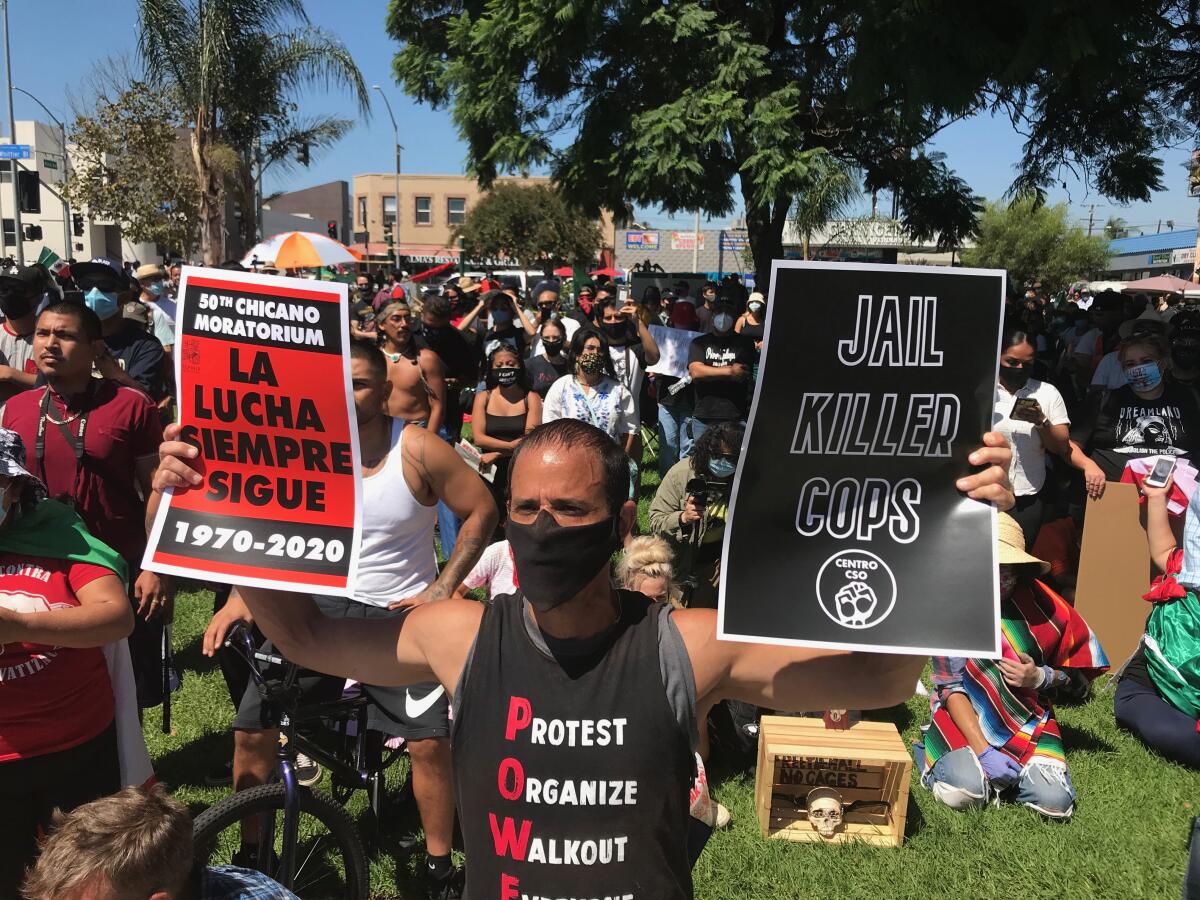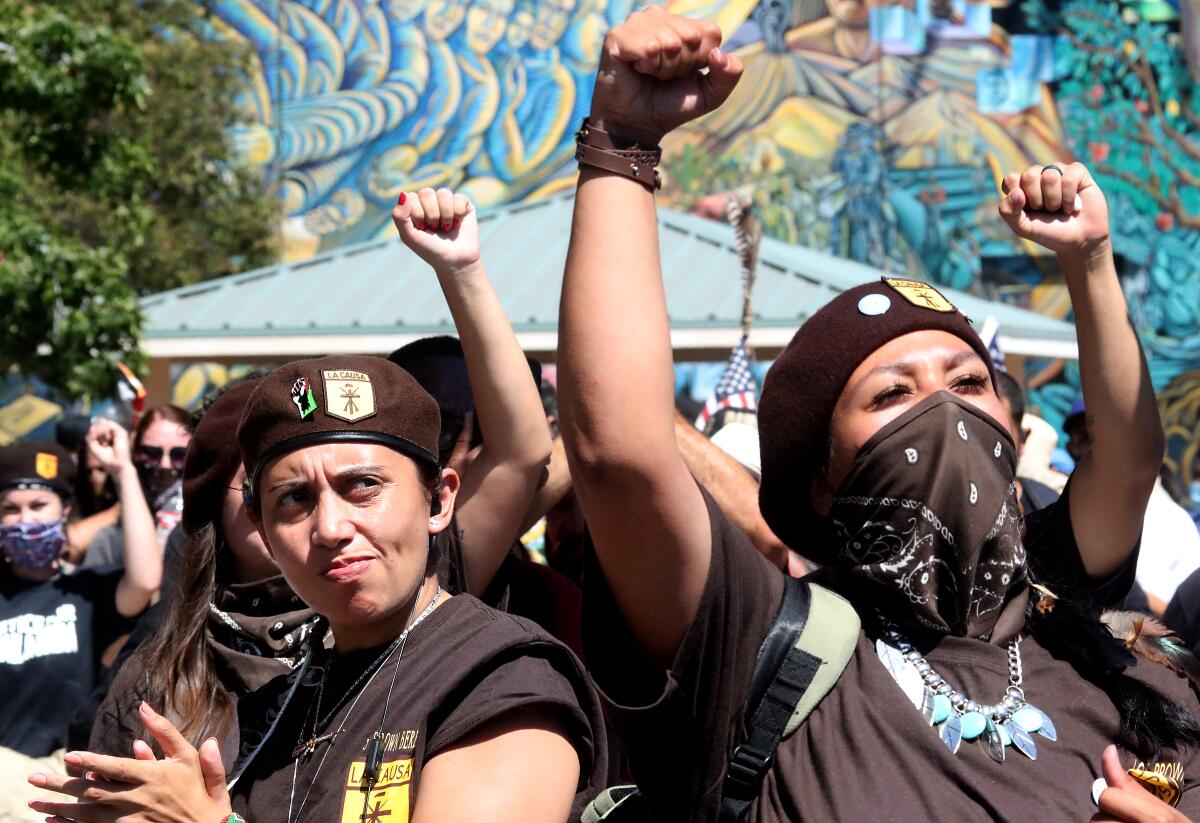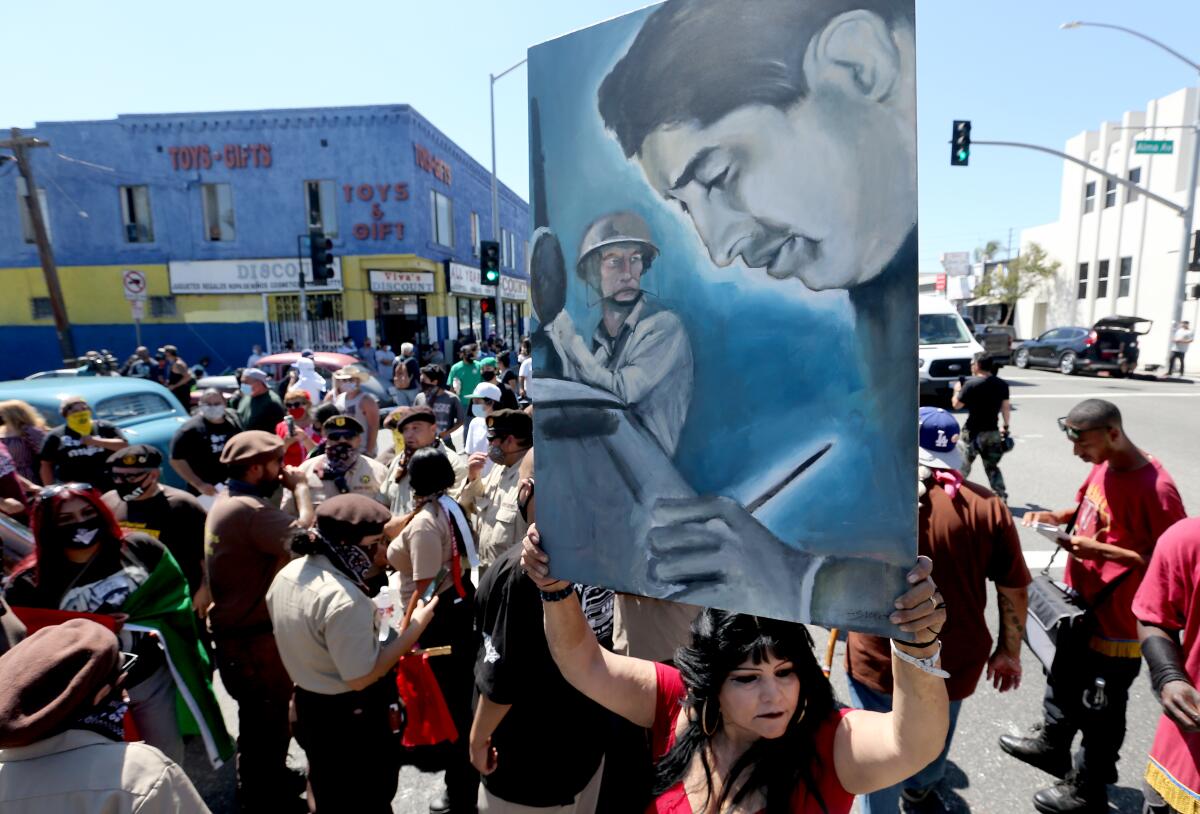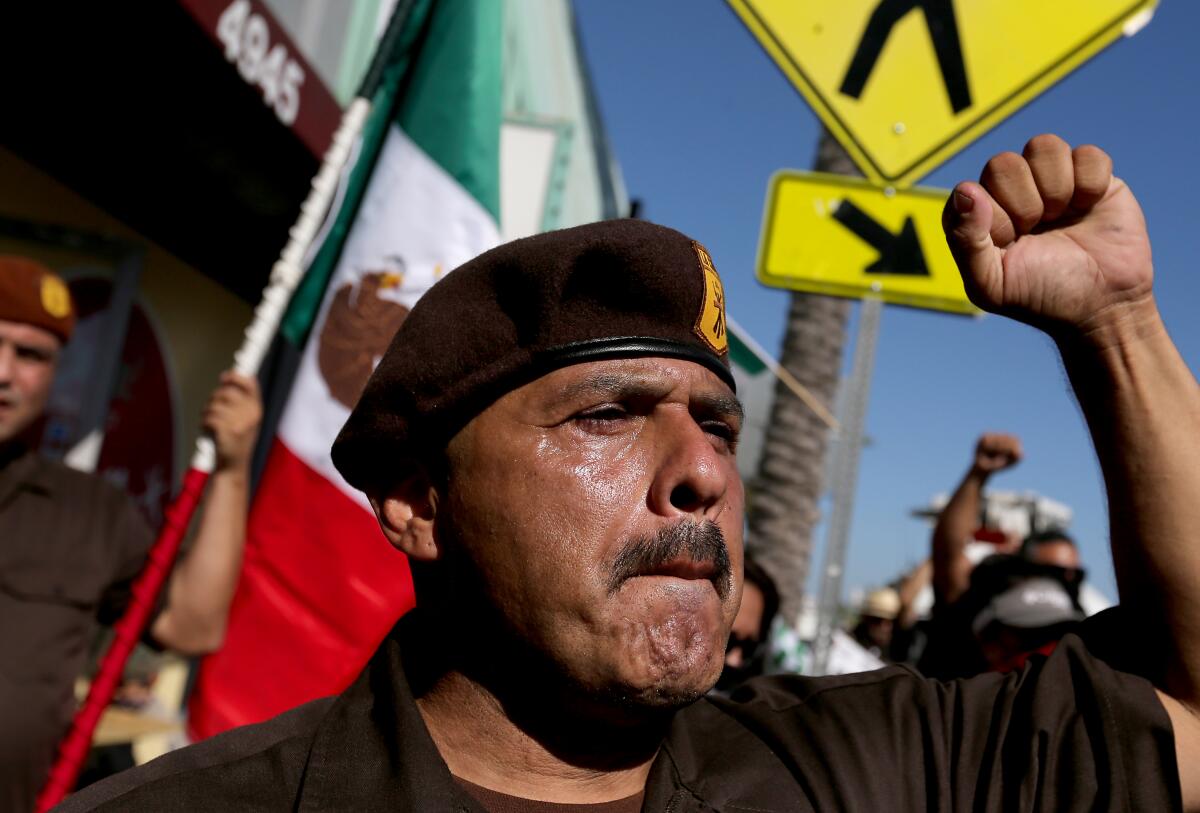Hundreds gather in East L.A. to mark anniversary of Chicano Moratorium

- Share via
Hundreds of people gathered in East Los Angeles on Saturday for a series of rallies marking the 50th anniversary of the Chicano Moratorium.
The Aug. 29, 1970, event started as a peace march and rally protesting the disproportionate death toll of Mexican American soldiers in the Vietnam War. But the day turned violent when sheriff’s deputies stormed Laguna Park and tried to disperse protesters with tear gas and clubs. Three people were killed, including Times journalist Ruben Salazar.
The 1970 rally, which was the biggest gathering of Mexican American demonstrators in U.S. history to that point, is recognized as a pivotal moment in the Chicano civil rights movement. Organizers of this year’s event point out that the issues highlighted — including racial injustice and law enforcement brutality — remain painfully relevant today.
Participants met Saturday at Atlantic Park and then marched to Laguna Park, which has since been renamed Salazar Park, for a second rally.
Before the march, about 50 Brown Berets from around the country formed a circle in the park as speakers reflected spontaneously on the meaning of the commemoration.

“It’s a continuation, not a celebration,” said L.A. native Lukas Tekolotl. “We are fighting for the same thing. That means we’re not doing something right. We’re not being effective. We have to look back.”
Sara Aguilar, 42, from Whittier, has taken to the streets annually for the Women’s March and most recently the Black Lives Matter movement. But as a Latina and a recent member of the Brown Berets, she couldn’t miss the Chicano Moratorium March.
Alongside her were Brown Berets from across the country: Houston, Chicago, Oregon, Fresno, Colorado and beyond.
She grew up in East L.A., and she hasn’t seen much progress since her youth.
“I don’t think much has changed as far as being treated equally or as a woman,” she said. “That’s why we’re still out here today. It’s not only a celebration but a continuation of our fight.”
She remembers, as a little girl in school, being “taught that I can’t speak Spanish and that I needed to learn English.
“I’m here to get back to my roots and fight for a future that’s different for the children.”
Kalpulli Tlaltekuhtli, an East L.A. ethnic dance group, performed in Aztec costumes with feathered headdresses and mandatory face coverings.
Rafael Avitia, co-chair of La Mesa Brown Berets, said the term “Chicano” encompasses all Indigenous people.
“We’re going to march and reassert who we are. La Gente de Aztlan [the people of Aztlan].”
Those gathered decried continued killings by both Los Angeles County sheriff’s deputies and Los Angeles police officers, as well as racism against the Latino community by the current presidential administration.

A crowd of about 500 men, women and children marched down Atlantic Boulevard toward Salazar Park some 2.5 miles away. Behind them, Brown Berets directed traffic on the busy street.
They held signs that said “End Police Brutality,” “Dump Trump. Vote 2020!,” “Unite,” “School not prison,” “Keep families together” and “Jail Killer Cops.”
They repeated, “Revolution! Nothing less,” “Black Lives Matter” and “Trump, Pence, out now!” to the beat of a drum.
A line of cars followed behind them, from which people waved Mexican flags and held signs saying “Chicanx Power.”
Fifty years ago, Esther Aguilar marched for the first time during the Chicano Moratorium with her sister and brother-in-law. Now 69 years old, Aguilar came out to her hometown of East L.A. with her daughter, Vanessa Valdez, to march against police brutality.
“We have to continue marching for him,” said Aguilar, pointing to the name Ruben Salazar on her sign, “and now, for all these people dying. It’s not fair and it’s sad, sad, sad.

“Innocent kids are getting killed by the police. It’s wrong.”
Valdez, 45, grew up listening to her mother tell stories about the 1970 protest. Two years ago, when she heard about the 50th anniversary march, she told her mom: “Let’s go!”
Her father, Victor Aguilar, a 73-year-old Vietnam veteran, made signs for the two women to march with: “It’s a beautiful day to be a Chicana,” said one. “I been marching since 1970” and “Ruben Salazar, Que Viva!” said the other.
“I don’t think anything has changed since 1970,” said Valdez. “I live in Montebello and you still see the racial profiling and you still see the cops” assuming that brown people are criminals, she added.
This November is a chance to see some change, they both said.
“We all have to go out and vote,” declared Aguilar.
Several other marches, forums and movie screenings examining the impact of the Chicano Moratorium will also take place this weekend. They include:
What: A march and socially distant car caravan hosted by the 50th Chicano Moratorium Committee along Whittier Boulevard to the site of the Silver Dollar Bar & Cafe for an outdoor performance of Teatro Urbano’s play “The Silver Dollar” and a program at Ruben F. Salazar Park.
When: 10 a.m. to 5 p.m. Saturday
Where: 50th Chicano Moratorium car caravan meets at 10 a.m. and departs 11 a.m. from Gregg Road and Whittier Boulevard; the group’s march meets at 10 a.m. at Atlantic Park, 570 S. Atlantic Blvd., Los Angeles. Caravan and march will stop at 4945 Whittier Blvd. (now Sounds of Music) for “The Silver Dollar” performance on the way to Ruben Salazar Park, 3864 Whittier Blvd., Los Angeles.
Info: chicano-moratorium-com or Chicano Moratorium Facebook page.
What: A virtual screening of the Phillip Rodriguez-directed documentary “Ruben Salazar: Man in the Middle” with opening remarks by L.A. Mayor Eric Garcetti and actor-producer Edward James Olmos, followed by a live discussion and Q&A with Rodriguez, U.S. Rep. Joaquin Castro, Univision “Edición Digital California” anchor Yarel Ramos, grassroots network Mijente co-founder Neidi Dominguez, author and educator Myriam Gurba and L.A. Times staff writer Daniel Hernandez.
When: 5 to 7 p.m. Saturday
Info: Register at chicanorebellionreconsidered.splashthat.com or USC Annenberg events page.
Cost: Free
What: A Brown Berets march, speeches, reception and performance of Teatro Urbano’s play “The Silver Dollar” at an outdoor theater on the site of the Silver Dollar Bar & Cafe, where journalist Ruben Salazar was killed.
When: 3 to 6 p.m. Saturday
Where: Meet between 3 and 4 p.m. at 4945 Whittier Blvd., Los Angeles, site of the Silver Dollar, now Sounds of Music. (Some participants will meet between 1 and 3 p.m. at Belvedere Park and march to the Silver Dollar site.) After speeches and performance, march departs Whittier Boulevard location for Belvedere Park and outdoor theater at East Los Angeles Library, 4837 E. 3rd St., Los Angeles. Reception will follow.
Info: brownberet.us/upcoming-events or facebook.com/brownberetnational
What: Webinar series hosted by the 50th Chicano Moratorium Committee with activists, artists and others taking part in discussions, short screenings and performances. Hosted by Lupe Carrasco Cordona, Carlos Montes, Benjamin Prado and Sol Már.
When: 5 to 6:30 p.m. daily through Sunday, all day Saturday
Info: chicano-moratorium.com, 50th Chicano Moratorium Facebook events page or live streaming from co-chair Lupe Carrasco Cardona’s Facebook page or Ethnic Studies Now Coalition Facebook page, with past seminars viewable in the video section of mentioned Facebook pages.
Cost: Free
More to Read
Sign up for Essential California
The most important California stories and recommendations in your inbox every morning.
You may occasionally receive promotional content from the Los Angeles Times.

















